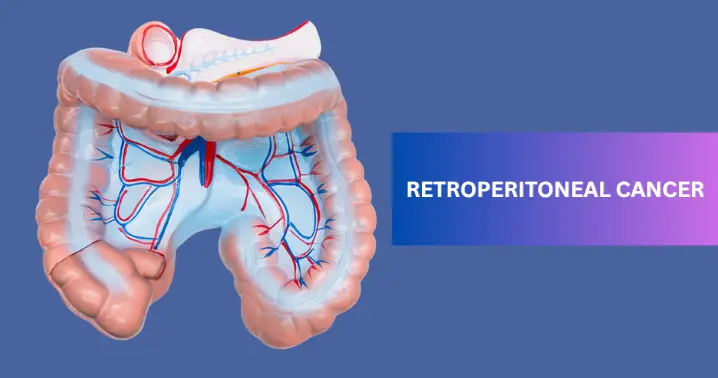- Home
- Retroperitoneal Cancer
Retroperitoneal Cancer

Retroperitoneal cancer refers to tumors that develop in the retroperitoneal space, the area located behind the abdominal cavity. This space contains important organs and structures such as the kidneys, pancreas, adrenal glands, parts of the intestines, and major blood vessels. Most retroperitoneal cancers are sarcomas, which arise from connective tissues like fat, muscle, or nerves. These tumors are rare and can grow quite large before causing noticeable symptoms due to their deep location.
Symptoms of retroperitoneal cancer may include abdominal pain, a feeling of fullness, unexplained weight loss, or a noticeable mass in the abdomen. Because of its hidden location, the cancer is often diagnosed at an advanced stage. Timely diagnosis, expert surgical removal, and access to specialized oncology care are critical for effective treatment. In cities like Ahmedabad, experienced surgical oncologists offer advanced options for managing this complex type of cancer.
What is Retroperitoneal Cancer?
Retroperitoneal cancer refers to tumors that develop in the retroperitoneal space, the area located behind the abdominal cavity. This space contains important organs and structures such as the kidneys, pancreas, adrenal glands, parts of the intestines, and major blood vessels. Most retroperitoneal cancers are sarcomas, which arise from connective tissues like fat, muscle, or nerves. These tumors are rare and can grow quite large before causing noticeable symptoms due to their deep location.
Symptoms of retroperitoneal cancer may include abdominal pain, a feeling of fullness, unexplained weight loss, or a noticeable mass in the abdomen. Because of its hidden location, the cancer is often diagnosed at an advanced stage. Timely diagnosis, expert surgical removal, and access to specialized oncology care are critical for effective treatment. In cities like Ahmedabad, experienced surgical oncologists offer advanced options for managing this complex type of cancer.
Signs and Symptoms of Retroperitoneal Cancer
- Abdominal pain or discomfort
- A lump or mass felt in the abdomen
- Unexplained weight loss
- Feeling of fullness or bloating
- Nausea or vomiting
- Back pain
- Changes in bowel habits
- Fatigue or general weakness
Retroperitoneal cancer often grows silently, as the retroperitoneal space allows tumors to expand without causing immediate symptoms. Most patients notice signs only when the tumor becomes large or starts pressing on nearby organs. Early medical evaluation is crucial when symptoms like abdominal pain, weight loss, or a visible mass occur. Early diagnosis can lead to better treatment outcomes.
Causes of Retroperitoneal Cancer
Genetic Mutations:
Changes in certain genes may trigger abnormal cell growth in retroperitoneal tissues.
Radiation Exposure:
Previous radiation therapy to the abdomen can increase the risk of sarcomas.
Inherited Conditions:
Syndromes like Li-Fraumeni or neurofibromatosis are linked to higher sarcoma risk.
Environmental Factors:
Long-term exposure to certain industrial chemicals may contribute to tumor development.
Chronic Inflammation:
Persistent inflammation in the retroperitoneal area might lead to abnormal cell changes.
Unknown Causes:
In many cases, the exact cause remains unclear due to the rarity of this cancer type.
If You Notice Any of These Symptoms
Diagnosis of Retroperitoneal Cancer
1. Imaging Tests
CT Scan / MRI – Helps locate the tumor and assess its size, shape, and spread.
PET Scan – Detects cancer activity and checks for metastasis in other organs.
2. Biopsy
Core Needle Biopsy – A tissue sample is taken using a needle for laboratory analysis.
Image-Guided Biopsy – CT or ultrasound guidance ensures accurate sampling from deep areas.
3. Blood Tests
Basic Blood Panel – Checks overall health and signs of infection or anemia.
Tumor Markers – May be used in some cases to support diagnosis and monitor response.

Treatments for Retroperitoneal Cancer in Ahmedabad
Retroperitoneal cancer is complex and requires a *multidisciplinary approach* involving surgical oncologists, medical oncologists, and radiologists. In Ahmedabad, expert doctors and advanced cancer care centers offer comprehensive treatment plans tailored to each patient’s condition and stage of disease.
Surgery
Surgery is the primary treatment for most retroperitoneal tumors, especially sarcomas.
It often involves removing the tumor along with surrounding tissues or organs if required, due to the tumor’s deep location.
Radiation therapy
Used before surgery (neoadjuvant) to shrink the tumor or after surgery (adjuvant) to reduce recurrence risk.
May also be used when surgery isn’t possible to control symptoms and slow tumor growth.
Chemotherapy
Administered for high-grade or metastatic retroperitoneal cancers, either before or after surgery.
Helps in shrinking tumors and preventing further spread, though not always effective for all tumor types.
Targeted Therapy & Immunotherapy
In select cases, newer treatments like targeted drugs or immune-based therapies may be used based on genetic testing.
These are usually considered for advanced-stage or recurrent cancers.
Palliative Care
Focuses on relieving pain, pressure symptoms, and improving the patient’s quality of life in advanced stages.
Supportive care services in Ahmedabad also include pain management, counseling, and nutritional support.
With experienced cancer specialists in Ahmedabad, including surgical oncologists like Dr. Ridham Shah, patients have access to expert evaluation, accurate diagnosis, and advanced treatment strategies that improve outcomes and survival rates.
Conclusion
Retroperitoneal cancer is a rare but serious condition that often remains undetected until it grows large. Early diagnosis and timely treatment are essential for improving outcomes and quality of life.

Why Dr. Ridham Shah
A Surgical Oncologist Practicing In The City Of Ahmedabad
- Experience of a decade in treating cancer
- Expertise in Laparoscopic cancer surgery, Robotic cancer surgery
- Expertise in Digestive System Cancers, Colorectal cancers , Peritoneal cancers, advanced abdominal cancers
- Expertise in Cytoreductive Surgery, HIPEC, PIPAC
- Excellent support staff to help you during treatment
- 360 degree care
Specialities

Ovary Cancer

Rectal Cancer

Colon Cancer

Endometrial Cancer

Liver Cancer

Esophageal Cancer

HIPEC Surgery

Robotic Surgery

Vulvar Cancer

Gallbladder Cancer

Stomach Cancer

Pancreatic Cancer

Cervix Cancer
